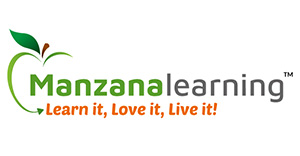Our Amici per sempre Program
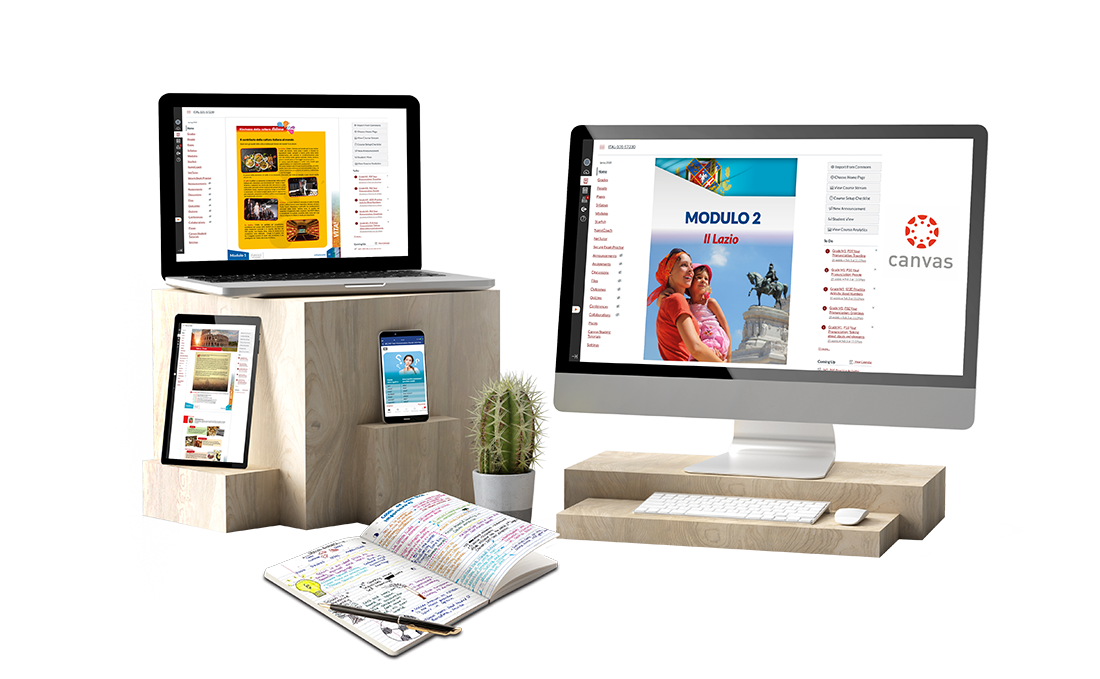
Italian courses
Our Amici per sempre program will cover 24 modules, from Beginning to Advanced Italian. As of Spring 2022, the program offers 12 modules for Beginning Italian I and II, and Intermediate Italian I.
Thanks to its modular nature, the Amici per sempre program allows instructors to design their courses according to the specific content they want to cover in their classes. Instructors may choose among the offered modules to create a course and arrange the materials in the preferred sequence, so the course is completely adapted to the pace of the students.
The sequence of modules helps students transition from one term to the other in a seamless progression. Each Module of Amici per sempre contains 3 sections: “Parole”, “Strutture” and “Vita!”.
About our courses
Tried, Tested and Approved
Our Courses Are Canvas-Native
Our Courses Are 100% Universally Accessible
Our Courses Allow for Total Personalization
VoiceThread Included
High Standards
Constantly Updated and Improved
Meaningful Feedback to Students
Assessment, SLOs and Rubrics
We have purposely avoided calling this section vocabulary, though it deals with words.
In every traditional textbook, the vocabulary section includes a list of words to be memorized, “learned” that students are responsible for memorizing. In Amici per sempre, words are not to be memorized but used, applied and played with.
As students work with Parole, they are in familiar territory. According to language experts, Italian and English share 60% of their vocabulary, with minor spelling variations in many cases. When the vocabulary is related to the sciences, the commonality rises to 90%!
Each Parole section includes from 10 to 13 tables or lists of words, totaling around 400 per module. Their relevance and reason for selection is related to their use in our Vita! section.
Students are asked to simultaneously read and listen to the words as they are pronounced by modeling voices, paying attention to their pronunciation and their meaning in English. Students are later asked to record after the modeling. The drill of recording their voices as they pronounce hundreds of relevant Italian words, will also foment students’ oral production in a non-threatening context.
Formative assessment related to words will go from basic identifications in beginning Modulos, to more complex applications in future courses.
Individual, paired, group and full class activities and discussions enable further practice. Students are asked to participate in engaging exercises of identification, matching, definitions and more. Activities are visually engaging and communicative.
In conclusion, the Parole section of this class is the student’s sandbox for playing with Italian words and preparing for extended grammar practice in Strutture, and an amazing linguistic and cultural immersion in Vita!
The Amici per sempre program supports a rich, visual and engaging approach to teaching grammar and learning.
The first activity of this section sets the stage for the learning objectives in this module. Students are asked to complete an introductory activity that uses visuals with no previous knowledge of the topic.
The subsection Osserva…. is a general introduction to the grammatical topic presented
Da notare… offers a more detailed presentation that helps introduce nuances around the main structural topic. There are many examples of translations and practical communicative applications of the topics at hand.
Each Quick quiz starts with a series of comprehension-checks, to ensure that students were able to follow the presentation. Terminology related to the topic is reviewed, and ample practice follows.
The Amici per sempre Vita! section is dedicated to each and every Italian-speaking territories.
Naming this section Vita! (vs. cultura) reflects our intention to introduce students to the many aspects of life in our countries.
- È così… is a visual introduction to the country in focus. Data related to population, political geography… among others. A simple True/False activity ensures critical thinking and comprehension.
- Tutto su… takes a glance at the history, geography, life and other relevant aspects of life in the target region, from past to present.
- Fatto in… highlights the creation, the arts and crafts and others that are at the base of the ingenuity of the people of the target region.
- La nostra lingua is a visual reflection on how our language works and how it can be used in practical-communicative situations, following the premise that visual comprehension precedes oral production.
- The Una finestra sull´Italia… readings introduce students to aspects of the Italian culture that are more general and common to the different regions presented.
- The Per comunicare section focuses on functional uses of Italian.
- In viaggio in… presents genuine landmarks and tourist attractions from the region.
- Imparare… insegnando is a section inviting students to share what they have acquired working with their preferred section of each modulo. The activity should be submitted via Discussions in Canvas or presented in class, after students have transformed their presentation in a short but meaningful vlog.
- La ricca cultura… highlights the different cultural values of the target region: Art, food, music…
- La nostra musica… is an opportunity to learn and enjoy the musical highlights of target regions.
- …illustri is dedicated to highlight the contributions of some exemplary people, both men and women, from the target region, in areas such as the arts, sciences, humanitarian work…
Our Amici per sempre Program

Italian courses
Our Amici per sempre program will cover 24 modules, from Beginning to Advanced Italian. As of Spring 2022, the program offers 12 modules for Beginning Italian I and II, and Intermediate Italian I.
Thanks to its modular nature, the Amici per sempre program allows instructors to design their courses according to the specific content they want to cover in their classes. Instructors may choose among the offered modules to create a course and arrange the materials in the preferred sequence, so the course is completely adapted to the pace of the students.
The sequence of modules helps students transition from one term to the other in a seamless progression. Each Module of Amici per sempre contains 3 sections: “Parole”, “Strutture” and “Vita!”.
About our courses
Tried, Tested and Approved
Our Courses Are Canvas-Native
Our Courses Are 100% Universally Accessible
Our Courses Allow for Total Personalization
VoiceThread Included
High Standards
Constantly Updated and Improved
Meaningful Feedback to Students
Assessment, SLOs and Rubrics
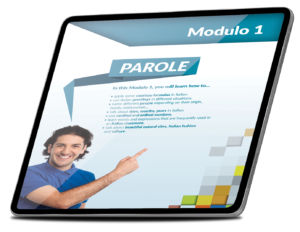
The Amici per sempre program supports a rich, visual and engaging approach to teaching grammar and learning.
The first activity of this section sets the stage for the learning objectives in this module. Students are asked to complete an introductory activity that uses visuals with no previous knowledge of the topic.
The subsection Osserva…. is a general introduction to the grammatical topic presented
Da notare… offers a more detailed presentation that helps introduce nuances around the main structural topic. There are many examples of translations and practical communicative applications of the topics at hand.
Each Quick quiz starts with a series of comprehension-checks, to ensure that students were able to follow the presentation. Terminology related to the topic is reviewed, and ample practice follows.
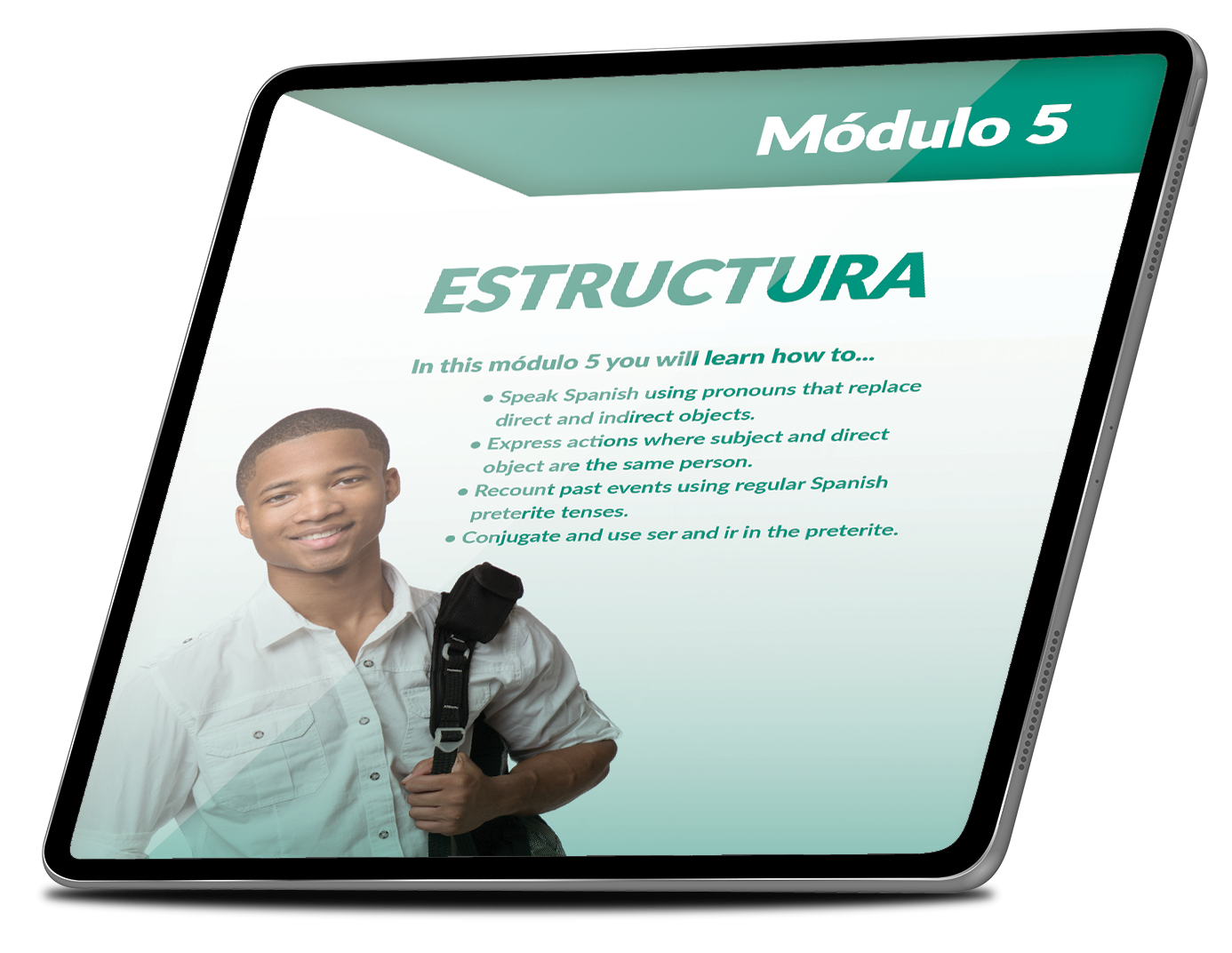
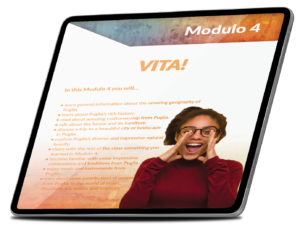
The Amici per sempre Vita! section is dedicated to each and every Italian-speaking territories.
Naming this section Vita! (vs. cultura) reflects our intention to introduce students to the many aspects of life in our countries.
- È così… is a visual introduction to the country in focus. Data related to population, political geography… among others. A simple True/False activity ensures critical thinking and comprehension.
- Tutto su… takes a glance at the history, geography, life and other relevant aspects of life in the target region, from past to present.
- Fatto in… highlights the creation, the arts and crafts and others that are at the base of the ingenuity of the people of the target region.
- La nostra lingua is a visual reflection on how our language works and how it can be used in practical-communicative situations, following the premise that visual comprehension precedes oral production.
- The Una finestra sull´Italia… readings introduce students to aspects of the Italian culture that are more general and common to the different regions presented.
- The Per comunicare section focuses on functional uses of Italian.
- In viaggio in… presents genuine landmarks and tourist attractions from the region.
- Imparare… insegnando is a section inviting students to share what they have acquired working with their preferred section of each modulo. The activity should be submitted via Discussions in Canvas or presented in class, after students have transformed their presentation in a short but meaningful vlog.
- La ricca cultura… highlights the different cultural values of the target region: Art, food, music…
- La nostra musica… is an opportunity to learn and enjoy the musical highlights of target regions.
- …illustri is dedicated to highlight the contributions of some exemplary people, both men and women, from the target region, in areas such as the arts, sciences, humanitarian work…
Our Italian courses
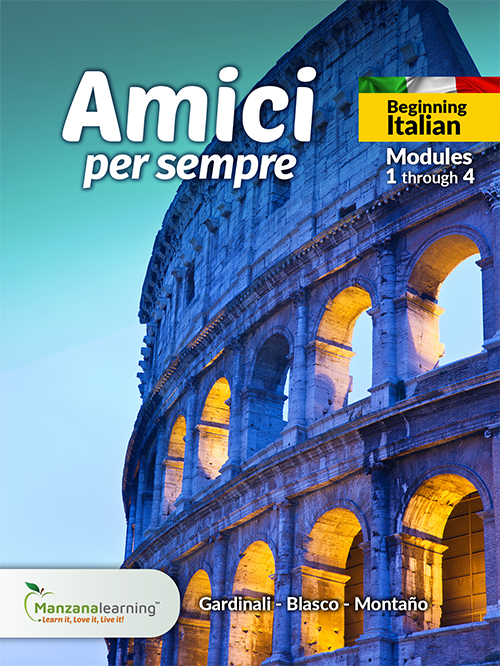
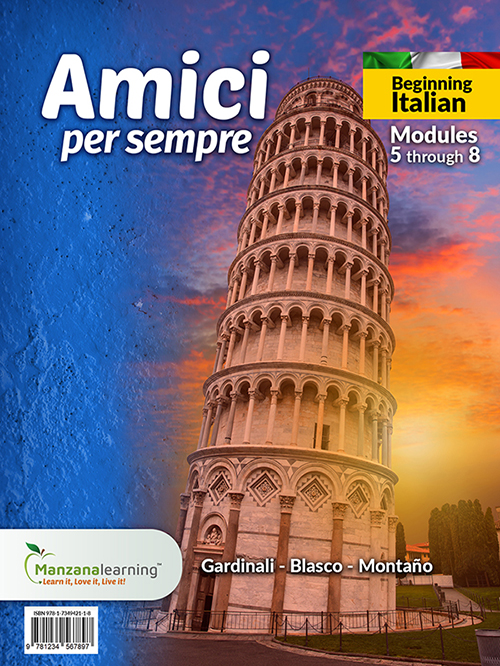
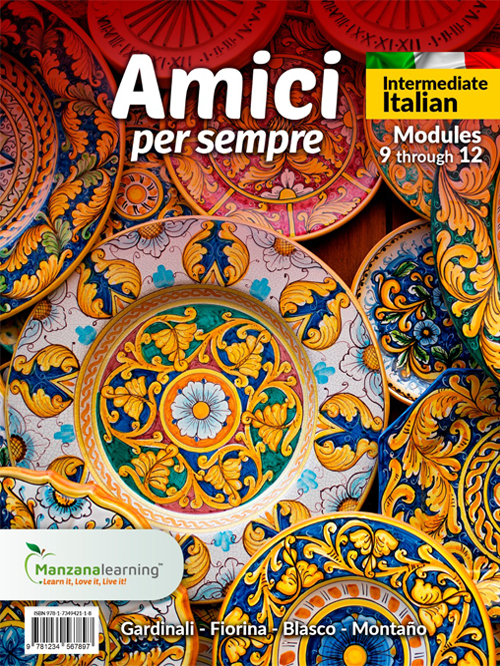

Modulo 1 is dedicated to Italian as a global language. This module covers its initial development, evolution, history, and different adaptations throughout the world. Basic concepts such as the Italian alphabet, cognates and numbers are introduced.
Parole
| Formule di cortesia | Courtesy formulas |
| Saluti | Greetings |
| Persone | People |
| Giorni, mesi, anni… | Talking About Days, Months, Years… |
| Numeri cardinali | Cardinal Numbers |
| Numeri ordinali | Ordinal Numbers |
| La classe di italiano | The Italian Class |
| Ammirare e descrivere luoghi molto belli | Admiring Natural Beauty |
| Viaggi | Travels |
| Luoghi ed elementi | Talking About Places and Elements |
| Cibo | About Food |
| Moda | Fashion |
| Per parlare di cultura | Talking about culture |
| Parole utili | Useful Words |
Strutture
| L’alfabeto italiano | The Italian Alphabet |
| Numeri | Numbers |
| Caratteri Speciali | Special Characters |
| Giorni e Festività | Days and Festivities |
| Formule di Cortesia | Courtesy Formulas |
| Parole affini e falsi amici | Cognates and False Cognates |
Vita
| È così… L´italiano nel mondo | This is Italian in the World |
| Italiano lingua ufficiale | Italian as an official language |
| Breve storia della lingua italiana | An Introduction to the History of Italian Language |
| L´italiano nel mondo | Italian in the World |
| La nostra lingua: Per imparare l´italiano | Our Language: Learning Italian |
| La nostra lingua: Per parlare italiano in classe | Our language: To Speak Italian in Class |
| La nostra lingua: Per parlare in classe | Our language: To Speak in Class |
| La nostra lingua: Una mentalità della crescita | Our language: A growth mindset |
| È così: L´italiano nel mondo | This is… Italian around the world |
| Per comunicare con gli altri | To Communicate with Others |
| In viaggio. Meraviglie italiane | Travelling. Italian wonders. |
| Imparare.. insegnando | Learning by Teaching |
| Ricchezza della cultura italiana | The Rich Italian Culture |
| La nostra musica. La musica italiana nel mondo. | Our music. Italian music around the world- |
| Italiani illustri | Exemplary Italian Figures |

Modulo 2 is dedicated to people from Il Lazio, and looks at their heritage and essential contributions to the diversely rich of Il Lazio.
Parole
| Parole interrogative | Interrogative words |
| Per parlare della lingua | Talking About Grammar and Language |
| Per parlare del Lazio | Talking About Il Lazio |
| Da paesi diversi | People from Different Countries |
| La descrizione fisica delle persone | People Physical Appearance |
| La personalità | Personality traits |
| Per descrivere le cose | To describe things |
| Per parlare del cibo e delle feste | Talking about food and celebrations |
| Le arti e le scienze | Arts and sciences |
| Parole utili | Useful words |
| Espressioni utili | Useful expressions |
Strutture
| Pronomi Soggetto | Subject Pronouns |
| Articoli determinativi e indeterminativi e partitivi | Definite and Indefinite Articles |
| Genere e numero dei sostantivi | Gender and Number of Nouns |
| Aggettivi | Adjectives |
| Il verbo essere | The verb essere |
| C’è / Ci sono | There is / There are |
Vita!
| È così… Il Lazio | This is Il Lazio | |
| Tutto su… Il Lazio | All About Il Lazio | |
| Fatto in Lazio | Made in Il Lazio | |
| La nostra lingua: Alla ricerca di un professore di Italiano su Skype | Our Language: Searching for Teachers of Italian Via Skype | |
| Una finestra sull´Italia | A Window to Italy | |
| Per comunicare: La nostra identità | To Talk About Our Identity | |
| In Viaggio in… Lazio | If You Travel to Il Lazio | |
| Imparare… insegnando | Learning by Teaching | |
| La ricca cultura del Lazio | The Rich Italian Culture | |
| La nostra musica. Il Lazio in Musica | Our Music. The music from Il Lazio. | |
| Laziali illustri | Exemplary people from Lazio |

Modulo 3 is dedicated to the amazing territory of Veneto and its people. Students are introduced to many activities that can be performed and to words that are used in Italian to label vocations.
Parole
| Storia, cultura, e civiltà | Culture and Civilization |
| Artigianato veneto | Veneto craftmanship |
| Le attività | Activities |
| Per esprimere la frequenza | Frequency |
| Persone e relazioni | People and relationships |
| Professioni e Mestieri | Professions and Occupations |
| Attività in Veneto | Activities in Veneto |
| Cucina e tradizioni | Cuisine and traditions |
| Arte, letteratura, musica e sport | Art, literature, music and sports |
| Parole utili | Useful words |
| Espressioni utili | Useful expressions |
| L’infinito | The Infinitive |
| Il presente indicativo dei verbi regolari –are, -ere, -ire | Present Tense of Regular -ar, -er, -ir Conjugations |
| Il verbo piacere | The verb piacere |
| Il verbo stare | The verb stare |
| Verbi irregolari avere e fare | Irregular verbs: avere and fare |
| Aggettivi possessivi | Possesive Adjectives |
Vita!
| È così… Il Veneto | This is Il Veneto |
| Tuto su… Il Veneto | All About Il Veneto |
| Fatto in… Veneto | Made in Veneto |
| La nostra lingua: Per parlare di cosa fare quando sei triste | Our Language: Talking About What We Do When We Are Sad |
| Una finestra sull´Italia | A Window to Italy |
| Per comunicare: Le nostre attività al lavoro | To Talk About our Tasks at Work |
| In Viaggio in… Veneto | If You Travel to Veneto |
| Imparare… insegnando | Learning by Teaching |
| La ricca cultura del Veneto | The Rich Venetian culture |
| La nostra musica | Il Veneto in Musica |
| Veneti illustri | Exemplary Venetian Figures |

Módulo 4 highlights beautiful and diverse Puglia. This module places emphasis on its amazing and varied geography.
Parole
| Attività | Activities |
| Storia, cultura e civilta | History, culture and civilization |
| Artigianato | Craftmanship |
| La casa e i mobili | The house and the furniture |
| Per parlare del luogo | Talking about location |
| Per parlare del tempo | Talking about time |
| Modo e quantità | Manner and quantity |
| Affermazione, negazione e dubbio | Assertion, denial, and doubt |
| In viaggio in Puglia | Travelling in Puglia |
| Cucina e tradizioni della Puglia | Foods and Traditions in Puglia |
| Musica, letteratura, politica e sport | Music, literature, politics, and sports/td> |
| Parole ed espressioni utili | Useful words and expressions/td> |
| Verbi irregolari con radice da una forma arcaica dell’infinito | Irregular verbs with stem from an archaic form of the infinitive |
| Verbi con irregolarità nella radice | Verbs with irregularities in the stem |
| Verbi con radice irregolare e/o terminazioni irregolari | Verbs with Irregular stem and / or irregular endings |
| Verbi modali: volere, dovere, potere | Modal verbs: volere, dovere, potere |
| Avverbi | Adverbs |
| Preposizioni | Prepositions |
| È così… La Puglia | This is La Puglia |
| Tutto su… La Puglia | All About La Puglia |
| Fatto in… Puglia | Made in Puglia |
| La nostra lingua: Per descrivere la casa | Our Language: To Describe Our Place |
| Una finestra sull´Italia | A Window to Italy |
| Per comunicare: I miei viaggi | To Talk About your Trip |
| In viaggio in.. Puglia | If You Travel to Puglia |
| Imparare… insegnando | Learning by Teaching |
| La ricca cultura della Puglia | The rich culture of Puglia |
| La nostra musica. La Puglia in Musica | Our Music. Music in La Puglia |
| Pugliesi illustri | Exemplary Puglian Figures |

Parole
| Per parlare di storia, cultura e civiltà | |
| Per parlare dell’artigianato della Lombardia | |
| Per parlare di abbigliamento | |
| Per parlare di moda | |
| Le attività quotidiana | |
| Che tempo fa? | |
| In viaggio in Lombardia | |
| Cucina e tradizioni della Lombardia | |
| Tradizioni della Lombardia | |
| Per parlare di arte, letteratura, scienze e sport | |
| Parole ed espressioni utili |
| Direct and indirect objects |
| Direct and indirect object pronouns |
| Telling the time |
| Talking about the weather |
| Reflexive and reciprocal verbs |
| Talking about past events |
| Passato prossimo |
| È cosi : La Lombardia |
| Tutto su… La Lombardia |
| Fatto in Lombardia |
| La nostra lingua: Il mio viaggio in Lombardia. |
| Una finestra sull’Italia: Gli italiani e le moda |
| Per comunicare: La routine quotidiana e l’abbigliamento |
| In viaggio in… Lombardia |
| Imparare… insegnando |
| La ricca cultura della Lombardia |
| La Lombardia in musica |
| Lombardi illustri |

Parole
| Per parlare di storia, cultura e civiltà |
| Per parlare dell’artigianato della Toscana |
| La città e i negozi |
| Al ristorante |
| Cibo e cucina |
| In viaggio in Toscana |
| Per parlare delle tradizioni della Toscana |
| Per parlare di musica, cinema e spettacolo |
| Per parlare di arte, letteratura, scienze |
| Per parlare di storia, politica e sport |
| Parole ed espressioni utili |
| Indefinite quantities: partitive articles and indefinite adjectives |
| Ci and ne |
| The Imperfetto past tense |
| Si with impersonal forms |
| È cosi : La Toscana |
| Tutto su… La Toscana |
| Fatto in Toscana |
| La nostra lingua: Per descrivere la casa |
| Una finestra sull’Italia: Gli italiani e la casa |
| Per comunicare con gli altri: I miei viaggi |
| In viaggio in… Toscana |
| Imparare… insegnando |
| La ricca cultura della Toscana |
| La Toscana in musica |
| Toscani illustri |

Parole
| Per parlare di storia, cultura e civiltà |
| Per parlare dell’artigianato della Sardegna |
| In vacanza |
| I mezzi di trasporto |
| Animali e vegetazione |
| In viaggio in Sardegna |
| Cibo e cucina |
| Tradizioni della Sardegna |
| Per parlare di musica, cinema e spettacolo |
| Parole ed espressioni utili |
| Choosing between Passato Prossimo and Imperfetto |
| The Trapassato Prossimo past tense |
| Double pronouns |
| È cosi : La Sardegna |
| Tutto su… La Sardegna |
| Fatto in Sardegna |
| La nostra lingua: Anna racconta le sue vacanze in Sardegna |
| Una finestra sull’Italia: Gli italiani e le vacanze |
| Per comunicare con gli altri: I miei viaggi |
| In viaggio in… Sardegna |
| Imparare… insegnando |
| La ricca cultura della Sardegna |
| La Sardegna in musica |
| Sardi illustri |

Parole
| Per parlare di storia, cultura e civiltà |
| Per parlare dell’artigianato del Piemonte |
| La tecnologia |
| Le parti del corpo |
| Per parlare della salute |
| In viaggio in Piemonte |
| Cibo e cucina |
| Tradizioni del Piemonte |
| Per parlare di musica |
| Arte e letteratura |
| Parole ed espressioni utili |
| The future tense |
| Disjunctive pronouns (Pronomi tonici) |
| Nouns with irregular plural forms |
| Verbs with special syntax |
| È cosi: Il Piemonte |
| Tutto su… Il Piemonte |
| Fatto in Piemonte |
| La nostra lingua: Itinerari in Piemonte |
| Una finestra sull’Italia |
| Per comunicare |
| In viaggio in… Piemonte |
| Imparare… insegnando |
| La ricca cultura del Piemonte |
| Il Piemonte in musica |
| Piemontesi illustri |

Parole
| Per parlare di storia, cultura e civiltà |
| Per parlare dell’artigianato della Campania |
| Per parlare di immigrazione |
| Per parlare dei problemi sociali e ambientali |
| In viaggio in Campania |
| Cibo e cucina |
| Per parlare delle tradizioni della Campania |
| Per parlare di musica, cinema e spettacolo |
| Per parlare di arte, letteratura, scienze |
| Per leggere |
| Parole ed espressioni utili |
| Il condizionale presente: esprimere desideri, probabilità e richieste cortesi |
| Il condizionale passato: esprimere intenzioni o desideri non realizzati nel passato |
| I gradi degli aggettivi: il comparativo |
| I gradi degli aggettivi: il superlativo relativo e assoluto |
| Comparativi e superlativi irregolari |
| È cosi: La Campania |
| Tutto su… La Campania |
| Fatto in Campania |
| La nostra lingua: Cosa dovremmo fare per risolvere i problemi sociali e ambientali? |
| Una finestra sull’Italia: L’immigrazione |
| Per comunicare con gli altri: Cosa faresti in queste situazioni? |
| In viaggio in… Campania |
| Imparare insegnando |
| La ricca cultura della Campania |
| Campani illustri |
| Scrittori campani |
| Leggiamo: extract from L’amica geniale by Elena Ferrante |

Parole
| Per parlare di storia, geografia e economia della Sicilia |
| Per parlare dell’artigianato e dei prodotti della Sicilia |
| Per parlare di storia |
| Le feste italiane |
| In viaggio in Sicilia |
| Cibo e cucina |
| Tradizioni |
| Per parlare di arti, scienze e giustizia |
| Per leggere |
| Parole ed espressioni utili |
| Arte e letteratura |
| Il passato remoto |
| I Pronomi relativi |
| Gli aggettivi e i pronomi indefiniti |
| È cosi: La Sicilia |
| Tutto su… La Sicilia |
| Fatto in Sicilia |
| La nostra lingua: Una biografia |
| Una finestra sull’Italia: Alcuni episodi della storia italiana / Le feste in Italia |
| Per comunicare con gli altri: Quante feste! |
| In viaggio in… Sicilia |
| Imparare insegnando |
| La ricca cultura della Sicilia |
| Siciliani illustri |
| Scrittori siciliani |
| Leggiamo: Il Cavaliere e la Volpe di Andrea Camilleri |

Parole
| Per parlare di storia, geografia ed economia |
| Per parlare dell’artigianato dell’Abruzzo |
| Emozioni e sentimenti |
| In città |
| Per parlare di enti territoriali e servizi |
| In viaggio in Abruzzo |
| Cibo e cucina |
| Feste e tradizioni |
| Per parlare di arti, scienze e economia |
| Per leggere |
| Parole ed espressioni utili |
| Il congiuntivo presente |
| L’imperativo |
| Le frasi esclamative |
| È cosi: L’Abruzzo |
| Tutto su… L’Abruzzo |
| Fatto in Abruzzo |
| La nostra lingua: Consigli per vivere bene |
| Una finestra sull’Italia: Gli enti territoriali e i servizi pubblici |
| Per comunicare con gli altri: Dare istruzioni e suggerimenti |
| In viaggio in… Abruzzo |
| Imparare insegnando |
| La ricca cultura dell’Abruzzo |
| Abruzzesi illustri |
| Scrittori abruzzesi |
| Leggiamo: Quell’amore di mia madre di Donatella di Pietrantonio |
